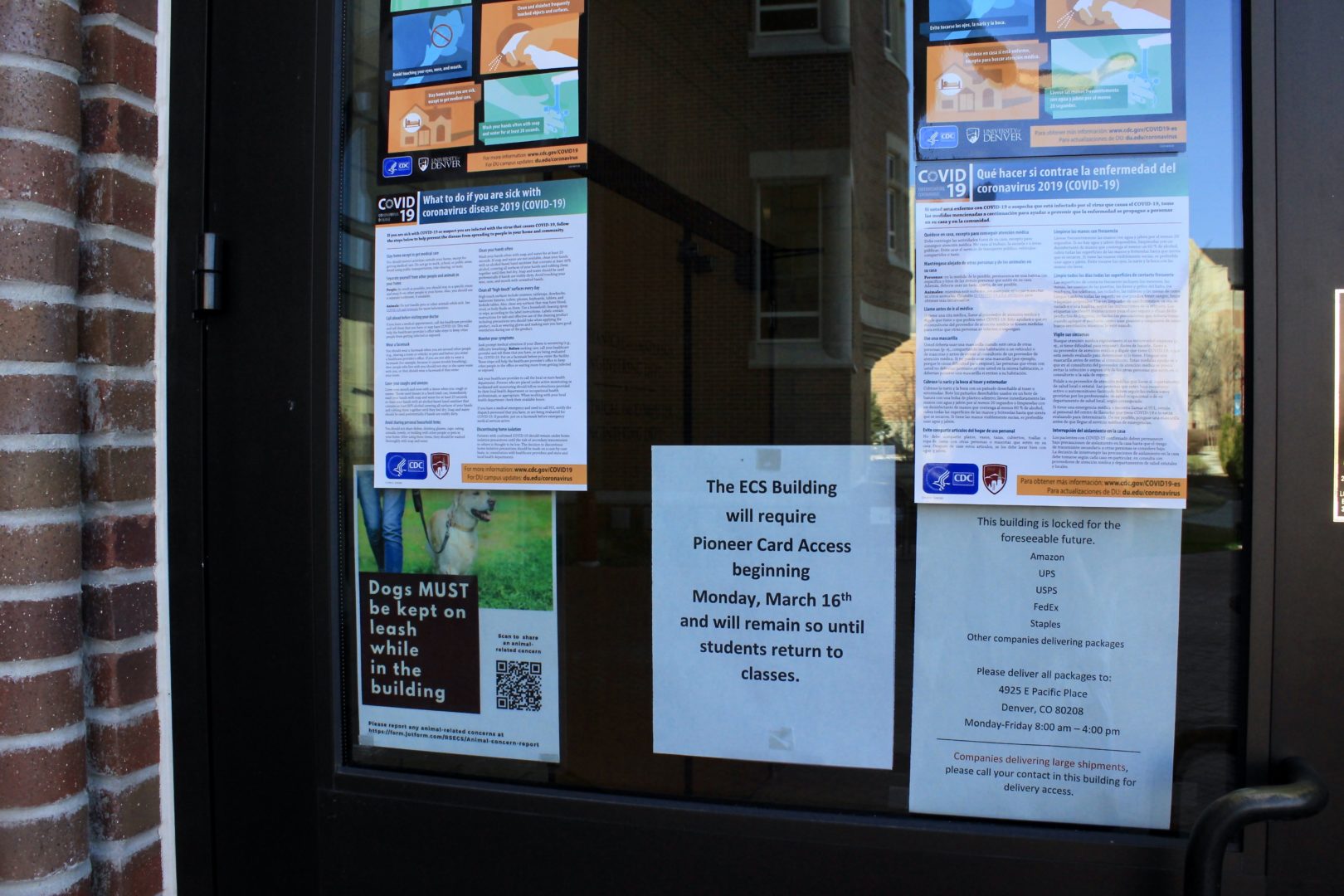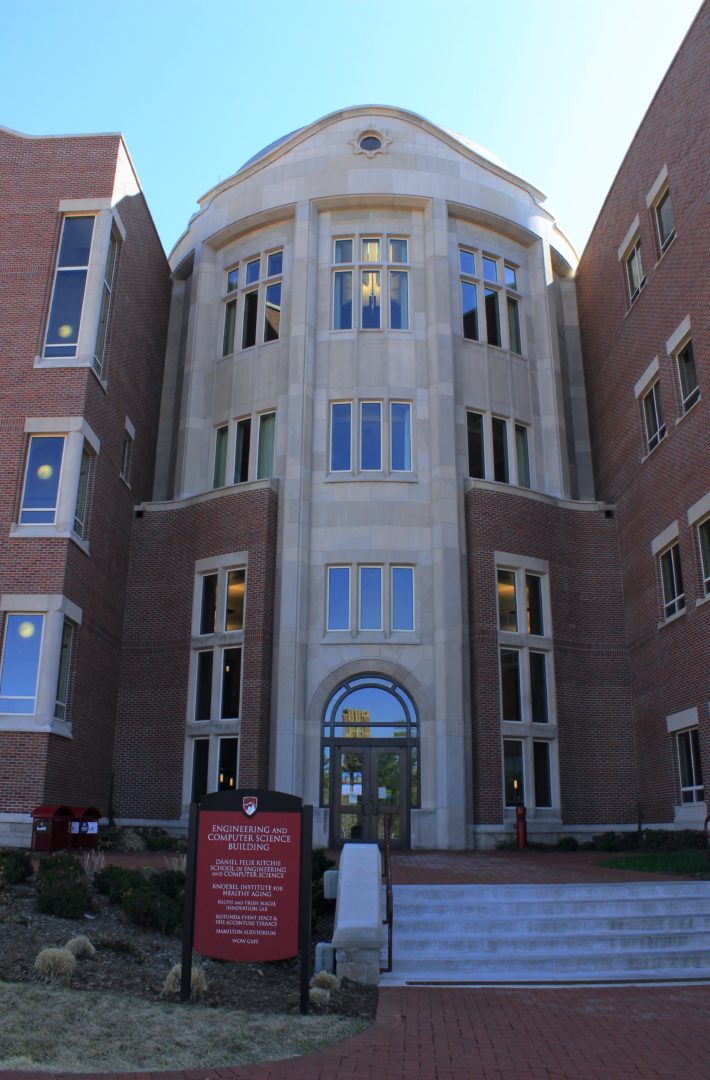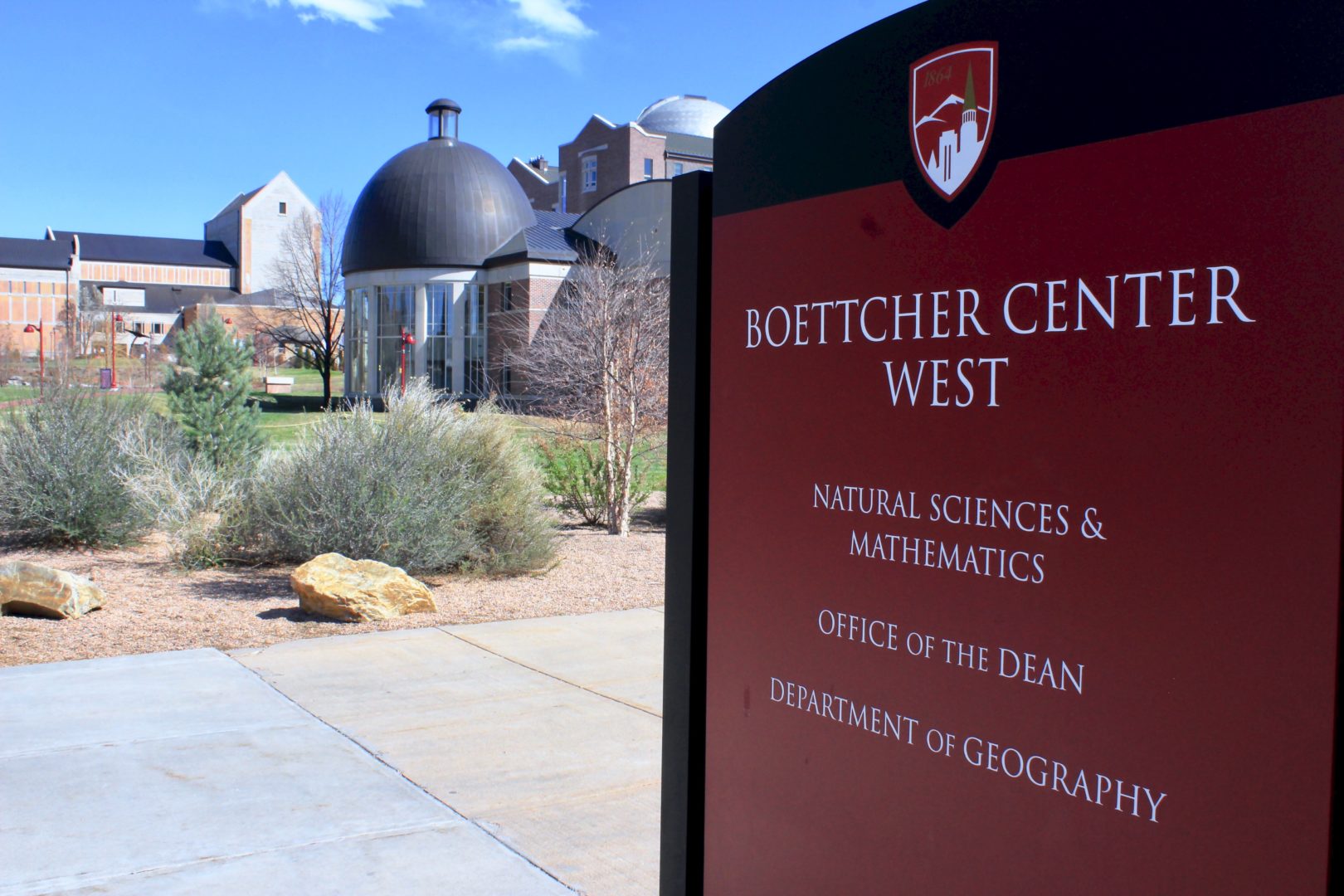You finally awake after sleeping in far too late. After shaking the fatigue out of your body, you complete your daily morning or middle-of-the-night routine, depending on your time zone. As you make the daily trek from your bed to your desk, you step into your computer’s classroom to take… a chemistry lab? Herein begins a day in the life of STEM majors during the coronavirus pandemic.
For a department used to programming and computers, DU’s STEM (Science, Technology, Engineering and Mathematics) programs are struggling to recode the entirety of Spring Quarter to an online format.
As Colorado’s COVID-19 cases increased in the last month, DU laboratories gradually became ghost towns and fieldwork hiking boots were stored away. Students in DU’s STEM fields geared up to face a unique set of roadblocks to their college narrative.

Though STEM fields are clichéd to provoke pictures of long white coats and futuristic robots, these casual connotations aren’t far off from what students are missing out on in their online quarter. While freshmen still in the youth of their STEM journey are struggling with the lack of access to tutors and in-person aid, third-year engineering students enrolled in “Integration” have their two-quarter robot projects locked in the engineering building.
“They’re rotting in there,” stated Yared Asmelash, a third-year mechanical engineering student, of the Integration robots stuck in the ECS (Engineering and Computer Science) building. A highlight of the DU engineering curriculum, Integration provides both a resume-booster and practical application experience for engineers. A group project in which students buy their own materials and build any kind of robot they want, the course has been forced to majorly succumb to online coursework. It has become “a joke” to Asmelash and many other students.
“We spent all this money to do something halfway, and we’re not even going to get to finish it,” stated Jon Katz, a third-year mechanical engineering student, of the Integration project. The course has now been revised to writing a research paper on engineering specifications. “We’ve probably spent over 100 hours on the robot. It’s just kind of disappointing that it got so downgraded.”
Perhaps even more detrimental in the engineering school is the interruption of the senior design project. In this year-long project, fourth-year DU engineers partner with big-time companies (think: Nike, Lockheed Martin) to conceptualize, prototype and fully create a project for the company to eventually use.
Whether it’s a soccer ball launcher for Nike or an eye-tracking device for disabled patients at Colorado’s local Craig Hospital, students harness real-world experience to dovetail into their careers. Senior design is the engineering degree’s zenith.

With no written prescription for how the projects are to be completed, the loss of this hands-on project thrusts seniors into further uncertainty, as they already grapple with graduating into a shattered job market.
“I’m pretty confident that if we’re not back on campus in the fall, I’m going to take the year off,” stated Katz. With his spring courses self-suspended, his fall study abroad trip to New Zealand cancelled and his full-time job at Pearl Street’s beloved Stella’s Coffee House on hiatus, Katz fears what his future holds.
Upon receiving the news that the entirety of spring quarter was to be held online, Katz made a difficult decision to take this quarter off. Being enrolled in so many hands-on classes, he said, made it virtually impossible to see a reason to take the quarter online.
“There’s nothing wrong with going to an online college, but I would pay a significantly less amount of money to go to an actual online school,” said Katz. “I don’t think it makes much sense for my parents to pay all this money and for me to take out all these student loans for something that’s not what we pay for.”
Katz also struggles with ADHD and described how it is “10 times harder to focus on the material” in an online format for students with the condition.
The thought of continuing to suspend his DU education, though difficult, seems a necessity for Katz if he is not able to take his full senior design course or miss out on in-person certification in machine shop courses that will prepare him to have a real-world job.
In addition, this full-year project situation doesn’t just affect engineering majors.
Samir Rezgui is a fourth-year student about to graduate with an ACS (American Chemical Society) chemistry degree. For chemistry students pursuing ACS certification, a grueling senior thesis project accompanies the entirety of their senior year.
“My biggest drawback to this online experience is the fact that I can’t do any more experiments towards my senior thesis,” stated Rezgui. “I had some really good and crucial experiments planned for this last quarter in order to wrap up my thesis… and with this whole online experience, I can’t do that. We’re not allowed to go into the laboratory.”
If the Colorado shelter-in-place order continues through the end of spring quarter and buildings on campus do not re-open, Rezgui plans to stay in Denver for the summer to finish his experiments but his work won’t be reflected in his thesis. In the meantime, he’s preparing for an uncertain upcoming school year as a grad student at CalTech.
Even for non-senior chemistry majors, most of the work is experimental and therefore limited without lab access. The same goes for a great deal of environmental science classes.
Fieldwork classes and labs in environmental science are all now either nonexistent or operating remotely. While a meteorology professor can awkwardly carry his Zoom class outside to show his students the weather and ask them to comment, the experience—like every other class on campus—just isn’t quite cutting it.

“I’m an environmental science major and an art minor, both of which are very hands-on,” stated Madeline Head, a third-year student. “I was supposed to be in a class that was field-based and laboratory-based, but I decided not to take it since it’s now being offered only online and that kind of defeats the whole purpose of the class, which is to go outside and take samples from nature and bring them back to the lab to analyze.”
Head is one of the many students who is also struggling with the lack of work-study employment. Previously holding a steady job at Schwader Art building’s photography desk, she can no longer work and receive financial aid. In addition, Head is coping with the mere cabin fever and mental health dampers that everyone around the world working from home is experiencing.
Rezgui spoke to this as well, stating, “Staying focused and motivated at home is a little harder to do. Additionally, sometimes my internet connection can lag or go in and out, so if it’s a live recorded lecture, as all my courses are right now, I kind of lose what’s going on.”
Internet courses in general are exposing the brand new issues facing college students. While many students rely on DU to provide their only space for WiFi, their finances become compromised when faced with working from home and purchasing a high-speed connection.
Even if the Internet connection is fully running, comments like “Is my mic on?”, “Raise your hand if you can hear me and see the PowerPoint” or “Sorry, my dog keeps barking in the background” leave Zoom lectures to be viewed as a joke and an opportunity for students to make memes about their teachers and other students and become famous on the Barstool Sports Instagram page.
While the image of a flustered chemistry professor drawing chemical structures on his home whiteboard may be dubbed as comical to onlookers, this comedy masks the cynicism and remorse underlying this online quarter. STEM majors aren’t typically part of the risk-prone gig economy. STEM fields are the highest paid college majors. Yet even in the fields that employment is usually abundant, COVID-19 has created a paralyzing fear of not finding a job after graduation.
There’s no laboratory-brewed chemical potion for seniors trying to cope with the anxiety of entering the job market during a global pandemic. There’s no Python code for the students with ADHD or OCD who now struggle with an entirely new set of motivational challenges and unhealthy home environments. There’s not a cheap home-version or thrift shop replacement for the thousand-dollar equipment in DU’s Makerspace. Students all across the STEM fields battle with these realizations.
Yet like many other majors, students in STEM are looking to take advantage of their time outside of class.
During his quarter off, Katz watches online tutorials of SolidWorks 3D design software, sits in on his roommate’s Zoom lectures, and takes an online programming course through MIT.
“I know that there’s nothing they can really do, like I’m not saying the school’s doing a bad job about it… I just actually think I’m going to learn more on my own than I would have in school,” said Katz.
Other students, like Rezgui, are investing their time into hobbies outside their major. If the quintessentially Type A, ambitious STEM students will be doing anything during this online quarter, you can guarantee it won’t include relaxing.
Though DU STEM majors won’t be able to see the spring sunlight blind their eyes in the Olin rotunda or see the ice slowly melt off the engineering pond, students around the world will be working (and Zooming) until they collapse. That’s the 21st century, burned-out college student way—isn’t it?











